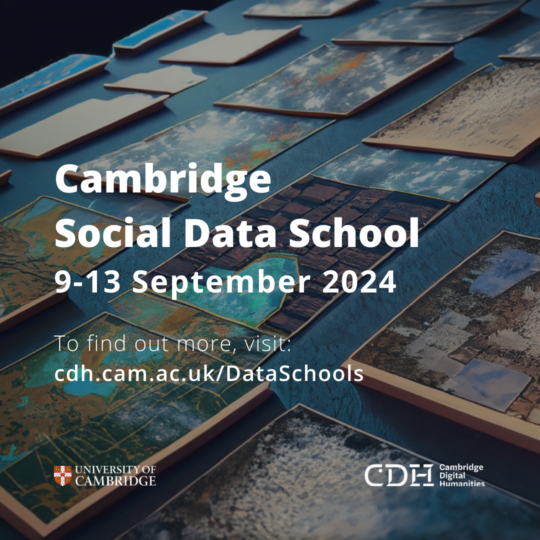| 15 Jun 2017 | 11:30am - 3:30pm | S1, Alison Richard Building | |
- Description
Description
The event is free to attend but please register for the workshop using the online registration link on this page or by clicking here.
This public workshop will mark the end of the 2017 programme of Machine Reading the Archive, a digital methods development programme organised by Cambridge Digital Humanities Network, Cambridge Digital History and Cambridge Big Data with the support of the Isaac Newton Trust.
It will showcase the digital archive projects created by this year's Track 2 participants as well as invited contributions from leading experts in the field.
Keynote speaker: Professor Andrew Prescott (University of Glasgow)
With contributions from: Dr Lauren Kassell (Casebooks project, University of Cambridge); Professor Alan Blackwell (Cambridge Computer Lab); Dr Anne Alexander (Digital Humanities Network)
Machine Reading the Archive aims to bring humanities researchers, archivists and computer scientists together to explore the challenges of working with archives in the digital age. Through a series of reading group sessions, practical workshops, technical demonstrations, field trips and a one day end-of-programme workshop, we hope to seed new collaborations and encourage the exchange of ideas and practices across professions and disciplines. The programme is born out of a recognition that the practice of making, curating and using archives has been changed by the adoption of digital technologies, at both an institutional and individual level.
Archives and library special collections are developing new roles as platforms for different kinds of data, held in a variety of formats from xml, to pdfs and tiffs, rather than physical containers for people, books and documents. Many researchers return from visits to the archive (or the archive’s website) having filled hard drives with collections of digital photographs of rare books, documents, manuscripts, maps, pictures and objects of scholarly interest whose fragility and immobility required the production of a digital copy. The digital archive thus seeds new private sub-collections on researchers’ laptops and tablets, at times a promising and overwhelmingly rich resources and at other times remaining invisible and inaccessible; while growing in scale and complexity over the trajectory of a scholarly life.
The primary aim of Machine Reading the Archive is to help participants develop a deeper understanding of the challenges and possibilities of working with archival data in the digital age, drawing on theory, methods and practice from the humanities, computer science and the archival profession. The program provides a chance to develop skills to engage with existing digital archives in new ways, to turn a cluttered hard drive of archival photographs into a refined dataset or to embark on the mission of text-mining to reveal new aspects in existing research or lay the groundwork for prospective projects. In addition to providing participants the chance to learn practical skills and experiment with digital methods using their own or provided datasets, the framework of the course is designed to ignite reflection on the significance of the ways private and institutional digital archives are sorted, structured and accessed and to discuss how these insular knowledge infrastructures impact and influence writing, thinking and the development of research projects.





